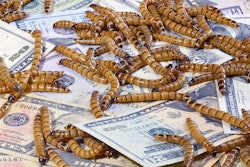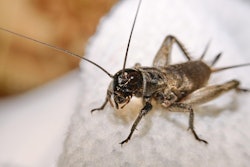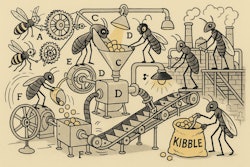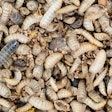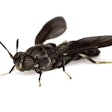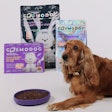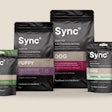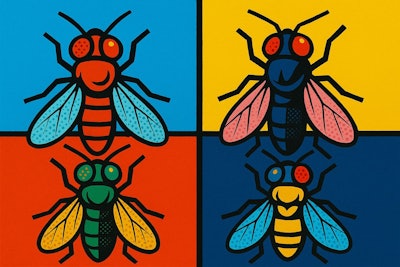
A study published in Veterinary Sciences evaluated the substitution of poultry fat with black soldier fly larvae oil in dry dog food. The research, conducted by scientists at Selçuk University in Turkey, investigated the effects of insect-derived fat sources on digestibility, blood biochemistry, immune markers, stool quality, palatability and oxidative stability in adult dogs.
“The inclusion of black soldier fly larvae fat in dry dog food formulations reduced nutrient digestibility and palatability but had no adverse effects on the health status of the dogs,” the researchers wrote.
The study used 18 Golden Retrievers for digestibility trials and 20 dogs for preference testing. Three experimental extruded diets were formulated: one with 6% poultry fat (control), one with a 50-50 mix of poultry and black soldier fly larvae fat (3% each), and one with 6% insect fat replacing poultry fat entirely.
Nutrient digestibility decreased with complete fat replacement
The inclusion of black soldier fly larvae fat led to lower digestibility for several key nutrients. Dry matter and organic matter digestibility were significantly reduced in the diet that fully replaced poultry fat. Protein digestibility declined in both partial and full substitution diets, while ether extract digestibility was lowest in the 100% insect fat group.
The researchers suggested that these reductions may have been linked to the high lauric acid content in insect fat. While lauric acid offers antimicrobial and anti-inflammatory properties, its distribution in triacylglycerols and higher melting point may limit solubility and absorption compared to long-chain fatty acids found in poultry fat.
Stool quality unchanged by insect-based fat
Despite digestibility challenges, fecal scores and pH levels remained within healthy ranges across all diet groups. However, the levels of short-chain fatty acids, particularly acetic acid, were significantly lower in dogs consuming black soldier fly fat. This suggests altered gut microbial fermentation patterns, possibly due to lauric acid’s impact on acetic acid-producing bacteria. Elevated levels of valeric acid and fecal ammonia in the insect-fat diets were also observed, aligning with decreased protein digestibility.
The study found no significant differences in serum biochemical markers, including glucose, cholesterol, triglycerides and liver enzymes, or immunoglobulin levels between the control and insect fat groups. The researchers concluded that, at least in the short term, black soldier fly larvae fat does not adversely affect overall health status or provoke allergic responses.
Palatability higher with poultry fat
In palatability testing, dogs showed a clear preference for the poultry fat-based diet. The insect fat diet was chosen less frequently during a four-day modified two-bowl preference trial. Researchers noted the stronger, less familiar odor of insect fat as a potential reason, along with its lower linoleic acid content. That fatty acid is associated with flavor and aroma that is more abundant in poultry fat.
The research also tracked the oxidative stability of the diets for 10-months. Although malondialdehyde (a marker of lipid oxidation) levels increased in all samples during storage, the rise was steeper in the insect fat group. Still, the values remained within expected limits, suggesting acceptable shelf life for commercial applications.
While black soldier fly larvae fat offers some advantages, such as a high lauric acid profile and environmental claims, it may not be a perfect replacement for poultry fat.
“The findings of this study suggest that BSFL fat cannot serve as a viable alternative fat source in dog food formulations,” the researchers wrote. “Also, high input amounts and costs currently hinder the widespread adoption of insect products. If vegetable oils and animal fats used in dog food formulations become more expensive, insect fats could be considered an alternative.”

